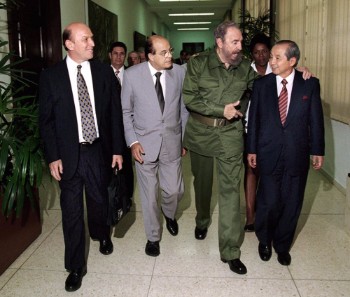
Baptist World Alliance leaders visit with Cuban President Fidel Castro during a July 8, 2000, meeting in Havana. Participants included (left to right) BWA General Secretary Denton Lotz, immediate past BWA President Nilson Fanini of Brazil, Castro and then-BWA President Billy Kim of Korea.
(Photo by Jim Veneman)
HAVANA—Cuban dictator Fidel Castro, who died Nov. 25 at age 90, is being remembered as both an unwitting catalyst of revival and an opponent of religious liberty.
Castro’s death, said Southern Baptists with ties to Cuba, is unlikely to yield significant increases in religious liberty for the island nation until the fall of the communist government he inaugurated 57 years ago.
When Castro led a revolt that overthrew then-Cuban dictator Fulgencio Batista in 1959, he instituted a communist regime that viewed Christians as “anti-revolutionaries.” And he barred them from attending universities or entering certain professional fields, according to the persecution watchdog group World Watch Monitor. But the global decline of communism in the early 1990s yielded decreased oppression of believers in Cuba.
Castro’s government was “really hard on the churches during the ’60s, ’70s and ’80s,” said Cesar Perez, a Cuban-born American who directs Hispanic ministries at First Baptist Church in Richmond, Ky. “Then because of the economic situation” when the Soviet Union fell and could no longer support Cuba, Castro “just let the churches go a little bit.”
Cuba’s communist party “is still in control,” Perez told Baptist Press, but the easing of restrictions “helped the churches.”
The more moderate pressure on churches continued after Castro ceded power to his brother Raul in 2008. Last month, for instance, a Cuban court sentenced the pastor of a 550-member house church to a year of house arrest for holding loud worship services, according to Morning Star News, a news service focusing on Christian persecution worldwide.
Among ongoing restrictions, construction of church buildings requires government permission, Perez said, as do large gatherings. Yet those restrictions have driven Cuban believers to launch a house church movement that has spurred “a revival for the whole island” for the past 20 years.
Heberto Becerra, a Fort Lauderdale, Fla.-area pastor who served in the 1970s as president of the Baptist Convention of Western Cuba, confirmed the report of revival in Cuba. He also said immediate change in Cuba’s treatment of churches is unlikely.
“Communism has set in already,” Becerra, pastor of First Baptist Church in Plantation, Fla., told BP through a translator. “It doesn’t matter if (Castro) died or not.”
Southern Baptists experienced the Castro regime’s totalitarian rule firsthand in 1965, when Home Mission Board workers Herbert Caudill and David Fite were arrested in Cuba along with 53 other Christian leaders, according to the “Encyclopedia of Southern Baptists.” BP reported at the time that the two missionaries were charged with “illegal foreign currency exchange.”
Caudill was released in 1966 and Fite in 1968.
In 1995, a Southern Baptist Convention resolution listed Cuba among nations experiencing “notable occurrences of oppression” directed at Christians.
In 2000, the world’s Baptists witnessed the apparent softening of Castro’s restrictions on religious life when Havana hosted the Baptist World Alliance General Council. At that meeting, the BWA adopted a resolution criticizing economic embargoes against Cuba as restricting access to food and medicine for innocent Cubans, according to a BP report.
Castro sent greetings to the BWA and specifically thanked meeting attendees for the resolution. He met with BWA leaders for two hours, according to BP.
A handwritten note from Castro dated July 8, 2000, thanked Baptists “for having chosen Cuba as the site of the council and for the unanimous resolution against the blockade,” according to BP’s translation of a copy of the note housed in the Southern Baptist Historical Library and Archives.
For a variety of reasons, the SBC voted to withdraw from the BWA four years later.
In the post-Fidel Castro era, a Florida Baptist Convention leader who has been coordinating missions in Cuba for 18 years says Baptists will continue to be salt and light among their neighbors in the Caribbean, though they expect little immediate change in the Cuban government.
“Things aren’t going to change a whole lot (in Cuba) until the last name (of its leaders) changes,” Craig Culbreth, the Florida Baptist Convention’s lead catalyst for missions and ministries, told BP. “And it’s still Castro. I think there will be some changes. How fast or how many I don’t know.”
In the meantime, Florida Baptists plan to continue sending an average of one mission team to Cuba every eight days, Culbreth said. That translates to about 40 teams per year assisting the Baptist Convention of Western Cuba and 10 assisting the Baptist Convention of Eastern Cuba.
The Florida convention provides 51 percent of the western convention’s budget, Culbreth said.
For Pablo Miret, a Cuban who pastors Iglesia Bautista Discipulos de Cristo in Miami, Castro’s death offers a ray of hope for Cuba’s future.
In a Facebook post he wrote, “What truly moves those of us who lived the communist experience in and outside of Cuba is the hope of a better future,” according to the Florida Baptist Witness’ translation. (BP)
David Roach